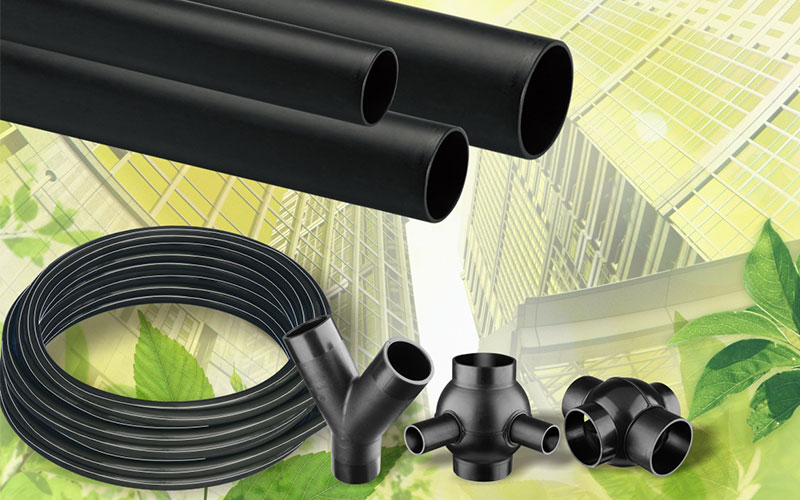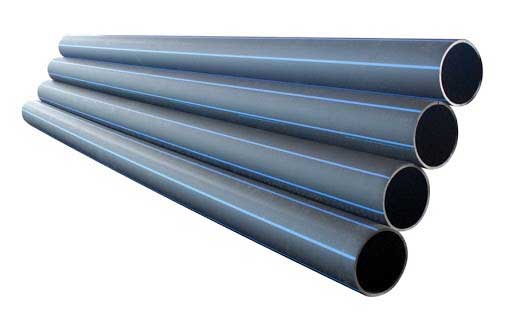The Advancement of American Plastics HDPE Pipe Manufacturing: What You Need to Know
A Comprehensive Guide to the Various Usages of HDPE Pipeline in Construction and Market
HDPE pipelines have become a crucial component in contemporary building and commercial applications. Their unique homes, such as resistance to deterioration and light-weight design, make them suitable for a vast array of uses. From supply of water systems to agricultural irrigation, HDPE pipes provide services that enhance efficiency and sustainability. Understanding their diverse applications is important for professionals wanting to optimize infrastructure. What details benefits do these pipelines give each market?
Water System and Distribution Systems
Water supply and circulation systems are important elements of urban framework, usually counting on high-density polyethylene (HDPE) pipes for their resilience and efficiency. These systems transportation drinkable water from treatment centers to customers, making sure access and security. HDPE pipes are favored for their resistance to deterioration, chemicals, and extreme temperatures, which enhances their long life and minimizes maintenance costs. Additionally, their light-weight nature enables for simpler installment and transport, making them perfect for numerous metropolitan and rural applications.
The adaptability of HDPE pipes allows them to be mounted in tight rooms and around challenges, decreasing the demand for comprehensive excavation (Pipe Manufacturing Midland TX). In addition, their smooth interior surface area reduces friction losses, boosting water flow rates. As cities remain to expand, the demand for reputable water supply systems boosts, positioning HDPE pipelines as a lasting solution for contemporary facilities tasks. Their proven performance history makes them a preferred option amongst designers and urban organizers alike
Wastewater Management and Therapy
Efficient wastewater monitoring and treatment are necessary for maintaining public health and wellness and ecological top quality. HDPE pipelines play an essential role in this procedure as a result of their sturdiness, resistance to deterioration, and capacity to endure extreme chemicals. These pipelines are generally made use of in numerous applications, consisting of sewer systems, stormwater water drainage, and wastewater therapy centers. Their light-weight nature promotes easier setup and transport, lowering labor prices and time.
In enhancement, HDPE pipelines have a smooth interior surface that decreases rubbing loss, advertising effective flow prices. They are also much less susceptible to leaks and failings contrasted to conventional products, making sure that contaminants are had successfully. Furthermore, their adaptability permits versatility in various dirt conditions, making them ideal for diverse environmental setups. As markets significantly prioritize lasting techniques, using HDPE pipes in wastewater monitoring systems aligns with objectives for reducing ecological influence and enhancing resource healing.
Agricultural Watering Solutions
In farming settings, efficient irrigation options are essential for enhancing plant returns and taking care of water resources. HDPE (High-Density Polyethylene) pipes play an important function in modern-day watering systems due to their resilience, versatility, and resistance to deterioration. Their capacity to withstand high pressures makes them perfect for both surface and subsurface irrigation applications, making sure consistent water circulation throughout areas.
Farmers can make use of HDPE pipes in drip irrigation systems, which deliver water directly to plant roots, reducing waste and advertising healthy and balanced development. Furthermore, these pipelines are light-weight and very easy to mount, reducing labor expenses and setup time. Their lengthy life-span and reduced upkeep demands additionally boost their allure in agricultural techniques.
HDPE pipes are eco pleasant, as they can be reused and do not seep unsafe chemicals right into the dirt. This makes them a lasting option for farmers intending to embrace green agricultural approaches while taking full advantage of efficiency.
Industrial Applications and Processes
Convenience is a characteristic of HDPE pipelines, making them vital in different industrial applications and processes. These pipelines are extensively used in chemical processing industries as a result of their exceptional resistance to a large range of harsh compounds. HDPE's lightweight nature, incorporated with high tensile toughness, enables simple installation and lasting efficiency sought after atmospheres.
In the oil and gas sector, HDPE pipelines play a necessary function in transferring hydrocarbons and gases, thanks to their longevity and versatility - American Plastics HDPE Pipe Manufacturing. Furthermore, they are used in mining view website procedures for the transportation of slurry and various other materials, where traditional piping systems might fall short
HDPE pipes are significantly utilized in making centers for water supply lines and wastewater administration. Their capability to withstand extreme temperatures and pressures makes them ideal for a range of industrial procedures. Overall, HDPE pipes add substantially to efficiency and safety across varied industrial applications.
Stormwater Monitoring and Drain Systems
Stormwater monitoring and drainage systems are essential elements in city facilities, created to manage excess rainfall and decrease flooding risks. High-density polyethylene (HDPE) pipes are progressively made use of cast iron sewer pipe repair in these systems as a result of their resilience, flexibility, and resistance to rust. These pipes efficiently carry stormwater away from inhabited areas, reducing surface runoff and stopping waterlogging.
HDPE's light-weight nature helps with much easier setup, minimizing labor prices and building and construction time. Furthermore, its resistance to chemicals and ecological stressors guarantees durability and dependability in various climates. In enhancement to typical drain applications, HDPE pipes are also used in ingenious services such as green framework, which consists of rain yards and absorptive pavements.

Regularly Asked Questions
How Does HDPE Pipe Contrast to PVC Pipeline in Price?
As a whole, HDPE pipeline often tends to be extra pricey than PVC pipeline as a result of its boosted resilience and versatility. Nevertheless, long-lasting expense factors to consider, such as upkeep and life-span, might prefer HDPE in details applications.

What Is the Lifespan of HDPE Piping Under Diverse Conditions?
HDPE pipes commonly have a life-span of 50 to 100 years, depending upon environmental problems, installment methods, and usage. Factors such as temperature, dirt kind, and direct exposure to chemicals can considerably affect their longevity.
Can HDPE Water Lines Be Recycled After Use?
Yes, HDPE pipelines can be reused after use. The reusing procedure includes melting down the material, enabling it to be repurposed into brand-new items, thus promoting sustainability and reducing ecological impact connected with plastic waste.
Exist Any Type Of Specific Installment Obstacles With HDPE Pipelines?
Installation obstacles with HDPE pipes include proper jointing strategies, making sure sufficient trench problems, and managing thermal development. Furthermore, skilled labor is required to handle customized devices, which can complicate the setup procedure in various atmospheres.

What Qualifications Should I Look for When Purchasing HDPE Pipes?
When purchasing HDPE pipelines, one ought to search for accreditations such as ASTM, AASHTO, and ISO, which verify high quality and compliance with sector criteria, ensuring sturdiness and performance in various applications. - Pipe Supplier American Plastics Midland